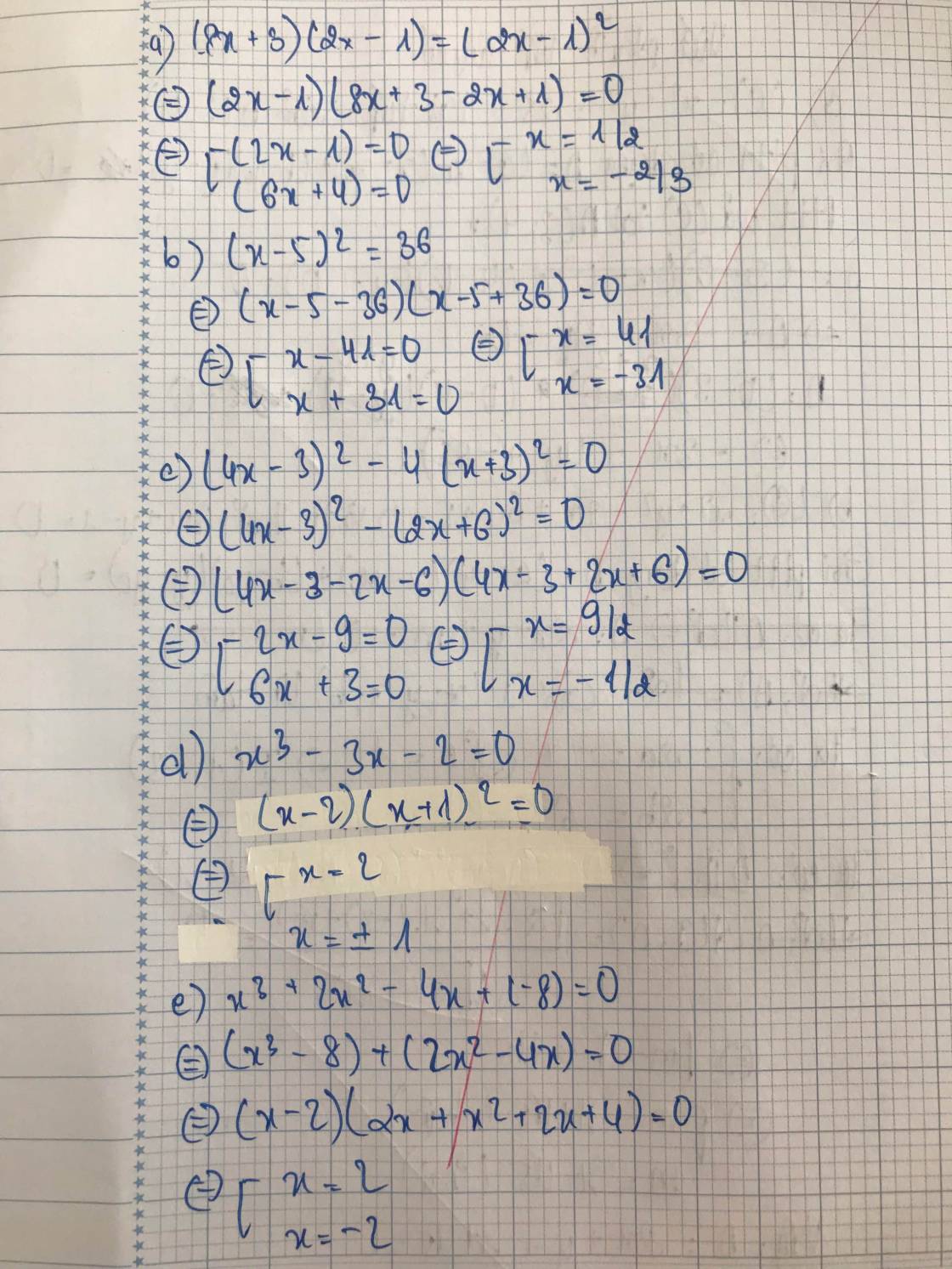Hãy nhập câu hỏi của bạn vào đây, nếu là tài khoản VIP, bạn sẽ được ưu tiên trả lời.

a: (3x-2)(4x+5)=0
=>3x-2=0 hoặc 4x+5=0
=>x=2/3 hoặc x=-5/4
b: (2,3x-6,9)(0,1x+2)=0
=>2,3x-6,9=0 hoặc 0,1x+2=0
=>x=3 hoặc x=-20
c: =>(x-3)(2x+5)=0
=>x-3=0 hoặc 2x+5=0
=>x=3 hoặc x=-5/2

*vn:vô nghiệm.
a. \(\left(x^2-2\right)\left(x^2+x+1\right)=0\)
\(\Leftrightarrow\left[{}\begin{matrix}x^2-2=0\\x^2+x+1=0\end{matrix}\right.\)
\(\Leftrightarrow\left[{}\begin{matrix}\left(x-\sqrt{2}\right)\left(x+\sqrt{2}\right)=0\\\left(x+\dfrac{1}{2}\right)^2+\dfrac{3}{4}=0\left(vn\right)\end{matrix}\right.\)
\(\Leftrightarrow x=\pm\sqrt{2}\)
-Vậy \(S=\left\{\pm\sqrt{2}\right\}\).
b. \(16x^2-8x+5=0\)
\(\Leftrightarrow16x^2-8x+1+4=0\)
\(\Leftrightarrow\left(4x-1\right)^2+4=0\) (vô lí)
-Vậy S=∅.
c. \(2x^3-x^2-8x+4=0\)
\(\Leftrightarrow x^2\left(2x-1\right)-4\left(2x-1\right)=0\)
\(\Leftrightarrow\left(2x-1\right)\left(x^2-4\right)=0\)
\(\Leftrightarrow\left(2x-1\right)\left(x-2\right)\left(x+2\right)=0\)
\(\Leftrightarrow\left[{}\begin{matrix}x=\dfrac{1}{2}\\x=\pm2\end{matrix}\right.\)
-Vậy \(S=\left\{\dfrac{1}{2};\pm2\right\}\).
d. \(3x^3+6x^2-75x-150=0\)
\(\Leftrightarrow3x^2\left(x+2\right)-75\left(x+2\right)=0\)
\(\Leftrightarrow3\left(x+2\right)\left(x^2-25\right)=0\)
\(\Leftrightarrow3\left(x+2\right)\left(x+5\right)\left(x-5\right)=0\)
\(\Leftrightarrow\left[{}\begin{matrix}x=-2\\x=\pm5\end{matrix}\right.\)
-Vậy \(S=\left\{-2;\pm5\right\}\)

b: \(\Leftrightarrow\dfrac{-3x^2+36x+12}{3\left(x+4\right)\left(x-1\right)}=\dfrac{36\left(x-1\right)}{3\left(x+4\right)\left(x-1\right)}+\dfrac{12\left(x+4\right)}{3\left(x-1\right)\left(x+4\right)}\)
\(\Leftrightarrow-3x^2+36x+12=36x-36+12x+48\)
\(\Leftrightarrow-3x^2+36x+12-48x-12=0\)
\(\Leftrightarrow3x\left(x+4\right)=0\)
=>x=0(nhận) hoặc x=-4(loại)

a) 3x-6=0
3x=6 => x=2
b) (3x+2)(4x-5)=0
=> 3x+2=0 => x=-2/3
hoặc 4x-5=0 => x=5/4
câu c ,d thiếu dấu '=" để thành 1 pt rồi bạn

\(a,\Leftrightarrow\left(3x-7\right)\left(3x+7\right)=0\Leftrightarrow\left[{}\begin{matrix}x=\dfrac{7}{3}\\x=-\dfrac{7}{3}\end{matrix}\right.\\ b,\Leftrightarrow\left(x+2\right)\left(x-1-1\right)=0\\ \Leftrightarrow\left[{}\begin{matrix}x=2\\x=-2\end{matrix}\right.\\ c,\Leftrightarrow4x^2-7x-2-4x^2+4x+3=7\\ \Leftrightarrow-3x=6\Leftrightarrow x=-2\\ d,\Leftrightarrow3x^2+2x+x^2+2x+1-4x^2+25=0\\ \Leftrightarrow4x=-26\Leftrightarrow x=-\dfrac{13}{2}\\ e,\Leftrightarrow x^3+27-x^3+x-27=0\\ \Leftrightarrow x=0\\ f,\Leftrightarrow\left(4x-3\right)\left(4x-3+3x\right)=0\\ \Leftrightarrow\left[{}\begin{matrix}x=\dfrac{3}{4}\\x=\dfrac{3}{7}\end{matrix}\right.\)
a) 9x2-49=0
(3x)2-72=0
<=> (3x-7)(3x+7)=0
th1: 3x-7=0
<=>3x=7
<=>x=\(\dfrac{7}{3}\)
th2: 3x+7=0
<=>3x=-7
<=>x=\(-\dfrac{7}{3}\)

a) 3x(4x-3)-2x(5-6x)=0
\(\Leftrightarrow12x^2-9x-10x+12x^2=0\)
\(\Leftrightarrow24x^2-19x=0\)
\(\Leftrightarrow x\left(24x-19\right)=0\)
\(\Leftrightarrow\left[{}\begin{matrix}x=0\\24x-19=0\end{matrix}\right.\Leftrightarrow\left[{}\begin{matrix}x=0\\24x=19\end{matrix}\right.\Leftrightarrow\left[{}\begin{matrix}x=0\\x=\dfrac{19}{24}\end{matrix}\right.\)
Vậy x=0 hoặc x=\(\dfrac{19}{24}\)

a) \(2\chi-3=3\left(\chi+1\right)\)
\(\Leftrightarrow2\chi-3=3\chi+3\)
\(\Leftrightarrow2\chi-3\chi=3+3\)
\(\Leftrightarrow\chi=-6\)
Vậy phương trình có tập nghiệm S= \(\left\{-6\right\}\)
\(3\chi-3=2\left(\chi+1\right)\)
\(\Leftrightarrow3\chi-3=2\chi+2\)
\(\Leftrightarrow3\chi-2\chi=2+3\)
\(\Leftrightarrow\chi=5\)
Vậy phương trình có tập nghiệm S= \(\left\{5\right\}\)
b) \(\left(3\chi+2\right)\left(4\chi-5\right)=0\)
\(\Leftrightarrow\left[{}\begin{matrix}3\chi+2=0\\4\chi-5=0\end{matrix}\right.\)
\(\Leftrightarrow\left[{}\begin{matrix}3\chi=-2\\4\chi=5\end{matrix}\right.\)
\(\Leftrightarrow\left[{}\begin{matrix}\chi=\dfrac{-2}{3}\\\chi=\dfrac{5}{4}\end{matrix}\right.\)
Vậy phương trình có tập nghiệm S= \(\left\{\dfrac{-2}{3};\dfrac{5}{4}\right\}\)
\(\left(3\chi+5\right)\left(4\chi-2\right)=0\)
\(\Leftrightarrow\left[{}\begin{matrix}3\chi+5=0\\4\chi-2=0\end{matrix}\right.\)
\(\Leftrightarrow\left[{}\begin{matrix}3\chi=-5\\4\chi=2\end{matrix}\right.\)
\(\Leftrightarrow\left[{}\begin{matrix}\chi=\dfrac{-5}{3}\\\chi=\dfrac{1}{2}\end{matrix}\right.\)
Vậy phương trình có tập nghiệm S= \(\left\{\dfrac{-5}{3};\dfrac{1}{2}\right\}\)
c) \(\left|\chi-7\right|=2\chi+3\)
Trường hợp 1:
Nếu \(\chi-7\ge0\Leftrightarrow\chi\ge7\)
Khi đó:\(\left|\chi-7\right|=2\chi+3\)
\(\Leftrightarrow\chi-7=2\chi+3\)
\(\Leftrightarrow\chi-2\chi=3+7\)
\(\Leftrightarrow\chi=-10\) (KTMĐK)
Trường hợp 2:
Nếu \(\chi-7\le0\Leftrightarrow\chi\le7\)
Khi đó: \(\left|\chi-7\right|=2\chi+3\)
\(\Leftrightarrow-\chi+7=2\chi+3\)
\(\Leftrightarrow-\chi-2\chi=3-7\)
\(\Leftrightarrow-3\chi=-4\)
\(\Leftrightarrow\chi=\dfrac{4}{3}\)(TMĐK)
Vậy phương trình có tập nghiệm S=\(\left\{\dfrac{4}{3}\right\}\)
\(\left|\chi-4\right|=5-3\chi\)
Trường hợp 1:
Nếu \(\chi-4\ge0\Leftrightarrow\chi\ge4\)
Khi đó: \(\left|\chi-4\right|=5-3\chi\)
\(\Leftrightarrow\chi-4=5-3\chi\)
\(\Leftrightarrow\chi+3\chi=5+4\)
\(\Leftrightarrow4\chi=9\)
\(\Leftrightarrow\chi=\dfrac{9}{4}\)(KTMĐK)
Trường hợp 2: Nếu \(\chi-4\le0\Leftrightarrow\chi\le4\)
Khi đó: \(\left|\chi-4\right|=5-3\chi\)
\(\Leftrightarrow-\chi+4=5-3\chi\)
\(\Leftrightarrow-\chi+3\chi=5-4\)
\(\Leftrightarrow2\chi=1\)
\(\Leftrightarrow\chi=\dfrac{1}{2}\)(TMĐK)
Vậy phương trình có tập nghiệm S=\(\left\{\dfrac{1}{2}\right\}\)